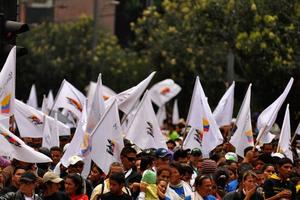The 100,000 person-strong Patriotic March that took place in Bogotá, Colombia, on April 29 may inaugurate a new phase in Colombian business-as-usual politics by injecting a new organized voice for the popular sectors. Tens of thousands of people descended into Colombia’s capital, Bogotá, to call for an end to the political violence, oppression, and poverty; a negotiated settlement of the armed conflict and social justice.

The event is an important development for several reasons. It came in the wake of last year’s popular demonstrations in the oil city of Barrancabermeja, in the department of Santander. With 1700 popular organizations participating in the Patriotic March, the Patriotic March could usher in the beginning of a left leaning movement with a widespread network covering most Colombian cities. The Patriotic March is helping to lift the voice of the rural population, a sector that has been particularly affected by the continuation of the civil war. If this movement is able to prosper it will help to create a critical popular movement that could propel the chances of a negotiated settlement of the armed conflict. Without such a grassroots movement the insurgency’s calls for a negotiated agreement will remain weak given that the current military balance of power is tilted in favor of the state.

The reactionary forces that stand to loose the most of a negotiated settlement and a reinvigorated popular movement did not wait long to act. At least three people associated with the organizing groups of the Patriotic March were assassinated under President Juan Manuel Santos’s Consolidated Democratic Security regime. Martha Cecilia Guevara Oyola, community leader in Caquetá, disappeared on April 20. Hernán Henry Díaz, an organizer with Fensuagro—Colombia’s largest peasant and farm workers’ union federation—arranged travel to Bogotá for 200 people from Putumayo, was disappeared on April 18. Mauricio Enrique Rodriguez, a communist and bodyguard for the President of the National Association of Displaced People of Colombia, was killed on April 27.
The enemies of peace and social justice in Colombia are many, but their friends are potentially much more. The question is: Can the Patriotic March harness this potential to include the millions and reach a tipping point for peace?
For more from Nazih Richani's blog, Colombian Cuadernos, visit nacla.org/blog/cuadernos-colombianos, or see the NACLA Report July/August 2009, "Coercion Incorporated: Paramilitary Colombia." Subscribe to NACLA

